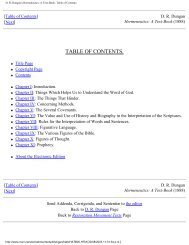Dungan - Hermeneutics
You also want an ePaper? Increase the reach of your titles
YUMPU automatically turns print PDFs into web optimized ePapers that Google loves.
D. R. <strong>Dungan</strong>'s <strong>Hermeneutics</strong>: A Text-Book: Chapter IV.<br />
think a good thought, of himself, the thinking world says your Bible teaches what every man knows to be<br />
false. Supposing that the Scriptures have been fairly dealt with, the thinking man turns away from them<br />
in utter disgust.<br />
(2.) Not only is the Bible made to teach what we know to be untrue, but also to contradict itself.--It is<br />
said that to come to God in any acceptable devotion, we must not only believe that God is, but that He is<br />
a rewarder of those who diligently seek Him. Then we are told that faith is a direct gift of God, and that<br />
the only thing that one can do in order to become a believer, is to ask God for that faith by which he can<br />
be saved. The logical mind balks at the sight of such confusion. He says: I can not be heard and have my<br />
prayer answered, unless I have faith when I go to Him. But I have not that faith, and am told that I must<br />
pray for it. That is, I must have the faith before the prayer can be heard, and I must pray before I can have<br />
faith. He says that such doctrine is nonsense. And, supposing that the exegetes have done their work all<br />
right, he declares the Bible to be self-contradictory, and, from that hour sneers at the claims of inspiration<br />
made in its favor.<br />
(3.) False methods have turned over the Bible to the clergy, as a kind of convenient toy.--We wonder<br />
that Christianity has outlived the treatment it has received at the hands of its friends. From the beginning<br />
of the fifth century to the close of the fifteenth, real scriptural examination was almost entirely dispensed<br />
with. The most ingenious travesty on the word of God was accepted as evidence of the fitness for the<br />
ministry of the man who could arrange it. Theology related to the forms of church government, or some<br />
question about Transubstantiation, [55] Trinity, Predestination, Indulgences, Penance, or whether tonsure<br />
should be made by shaving the head from the forehead, backward over the crown, or to begin at one ear<br />
and shave over the crown to the other ear. This was a grave question, on which the English Church and<br />
the Church of the Pope could not agree, until it was settled by King Oswy, before whom the question had<br />
been argued by the ablest theologians of the time.<br />
There were reformers, here and there, who wished to give to the people the word of the living God,<br />
and to urge them to follow it as their guide to heaven; but, as said before, they were few in number, and<br />
their power for good was scarcely felt. Religious people were controlled by scientific theology, and not<br />
by the word of God. As the philosophical puzzles of the day had little or nothing to do with the<br />
Scriptures, everything was left to those who had the time and were paid to attend to such things.<br />
We think that it was a great misfortune to have lived in that day, and yet how much have we<br />
improved? Orthodoxy and heterodoxy are determined now, more by the canonized authorities than by the<br />
word of God. If a missionary now be questioned as to the soundness of his faith, it is to be decided more<br />
by the custom of the church, than by the word of Scripture. The sensational sermons of to-day are<br />
excused on the ground of dullness of the people and the need of something to appetize them. But<br />
whatever the cause, it is lamentably true that the masses are getting but little help in understanding the<br />
Bible from the pulpit at the present time. Upon the weaknesses of the pulpit, not of ancient, but of<br />
modern time, in matters of exegesis, I have nowhere seen a clearer or more manly statement than is to be<br />
found in [56] a work of Homiletics, "The Theory of Preaching," by "Austin Phelps, D. D., late Professor<br />
of Theology in Andover. He says:<br />
http://www.mun.ca/rels/restmov/texts/ddungan/hatb/HATB04.HTM (5 of 29) [30/08/2003 11:33:02 p.m.]




